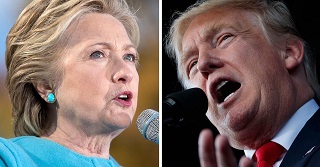
Bruce Clemenger, president of the Evangelical Fellowship of Canada, believes Canadian religious leaders should remain non-partisan in terms of party politics.
Evangelical Fellowship of Canada president Bruce Clemenger reflected recently on the difference between calling for justice and remaining non-partisan. This comment is re-posted by permission from the EFC site.
The debate over whether evangelical leaders should endorse Donald Trump became more intense with the release of a 2005 video containing comments by the U.S. presidential nominee about making sexual advances toward married women and kissing and groping women without consent.
This revelation led one prominent evangelical ethicist, Wayne Grudem, to change his mind about endorsing Trump, and Christianity Today executive editor Andy Crouch wrote a strong editorial denouncing Trump and challenging those evangelicals who support his candidacy.
Others, such as Jerry Falwell Jr. have maintained their support. Media outlets are pursuing others who had publicly supported Trump to see whether the events of the last few weeks have changed their minds.
Would such a situation ever happen in Canada? It is unlikely.
Charitable status prevents partisanship

Canadian church and ministry leaders have not gotten caught up in party politics – as has happened in the U.S. – and Bruce Clemenger would like to keep it that way.
We have a tradition in Canada of religious leaders refusing to be partisan – of not endorsing or promoting one political candidate or political party over another.
This is consistent with the rules of the Canada Revenue Agency (CRA). While charities can comment on issues from their expertise and even show how candidates for public office voted on legislative initiatives, they cannot endorse – doing so would cause them to lose their charitable status.
The CRA maintains that charities are distinguishable from political parties and that the resources of charities are to be used for charitable purposes and not to advance partisan politics. If you want to be partisan, you are free to form a political party – or forgo charitable status.
But our system says you can’t skew the purposes of the charity to accomplish another, specifically partisan, purpose. And as I read it, this restriction not only applies to Canadian politics but to political candidates elsewhere. So don’t ask who I would prefer for American president – I won’t say.
Of course, a leader of a religious organization could endorse without necessarily implying the organization also endorses, but this is a very thin line. Usually the public identity of the leader is so intertwined with the identity of the organization that most would not make a distinction between the two. Also, none of the organization’s resources (computer, phone, paper, server, including the work time of the leader) can be used for partisan political purposes.
This requirement of being non-partisan is also true for charities in the US. However, many religious leaders, and specifically evangelical leaders, offer political endorsements nonetheless.
I’m not sure what the reason for this difference is, perhaps there is more fear of the CRA in Canada than the IRS for American leaders. But I think there is more to it. There are other reasons, reasons which trump (sorry, couldn’t resist) the position of the CRA and explain why Canadian leaders are more circumspect.
Unique place and calling
For a religious organization to endorse a political candidate or a party would create confusion for a watching world. Church and state are distinct institutions with different purposes.
The Church and related ministries have a unique place and calling. Part of that calling is to seek the good of our land. Churches and Christian ministries encourage and support policies or legislation that will bless all Canadians and make our country a better place, that will foster justice. In this sense the Church does and should engage with governments.
But the Church should not be too closely aligned with a given political party or candidate. The Church is not a suitor of earthly political power. The Church and its ministries should not be closely aligned with Caesar – with earthly powers or with political parties, lest it be compromised in its witness. And those who give leadership to churches need to model this in their office as leaders, both symbolically and practically.
Prophetic role, political involvement
The Church is better able to fulfil its prophetic role at arm’s length. It must be able to critique and not be seen to be compromised. The Church cannot afford to be seen to be as defender of the politician if he/she wins, nor risk having its voice marginalized if another wins. To do so would limit the Church’s ability to engage in the process, particularly when you often need to work across party lines.
I believe Christians should vote and be involved in politics. In fact, I think God calls us to civic and political engagement. Christians should be involved in politics for the same reasons it is good and proper to engage in business and in education. This is part of the world God has made, and in which he calls us to serve him and be good stewards of all he has given.
Governments play important roles, and law and public policy are vital spheres of engagement, to which the principles of the Bible have a lot to say. To this end, as Christians, we can form or join parties. We can run for office. And as churches and ministries, we can engage in advocacy. Churches have a legitimate place in calling governments to be just. But this is different than churches’ being partisan or aligning with political parties or ideologies.
Canadian history plays a role
Perhaps in part it is also a Canadian thing – politicians don’t wear their religion on their sleeve, and churches should not wear their partisan preferences on theirs. From the outset, for someone to govern Canada they needed the support of both devout Roman Catholics and devout Protestants. Whether the leader was Catholic or Protestant, they could not afford to be too sectarian; they had to be seen to be able to serve both and foster collaboration across differences.
Since then Canada has become more religiously diverse. But then, and now, Canadian religious leaders rarely wear their partisan views on their sleeves.
Issues of representation, expertise
Further, it is likely that the political views of the religious leader may differ from those of many within her or his flock, and any endorsement may erode the relationship between the leader and those belonging to and/or supporting the organization, thereby compromising the ability of the leader to fulfil the purposes of the organization.
Similarly, the policy platform of a given party is often much broader than the expertise of a religious organization; is the leader endorsing the person or the platform? And, how often has the political agenda of a given party aligned perfectly with the social teachings of a given church?
It is important to affirm the religious purposes of the entities we serve, whether as pastors, denominational leaders or, in my case, the head of The Evangelical Fellowship of Canada, an association of Christian organizations and institutions. But this should not be confused or conflated with any partisan agenda. To reinforce this, it is wise not to be partisan.
Looking to Canada
I actually think some American evangelical leaders admire the restraint. When few endorse, there is less pressure to do so yourself. I was recently on a conference call with several American evangelical leaders and after the agenda was finished, I asked who was their preference. There was a long silence, and then one quipped that I could surmise from the silence that they have learned not to answer that question.
So, in the end, I think the practice of Canadian evangelical ministry leaders refraining from endorsing is appropriate and correct, even if they are tempted to be partisan. And if they are so tempted, the Canada Revenue Agency is always watching over their shoulder.
******************************
There have been innumerable commentaries about the intertwining of church and state during the current election cycle. I (Flyn Ritchie, not Bruce Clemenger, to be clear) found The Religious Right: A Eulogy by Rod Dreher to be particularly interesting. It begins:
Southern Baptist leader Russell Moore delivered one hell heck of a speech Monday night [October 24] in New York. When First Things magazine tapped Moore to deliver its prestigious annual Erasmus Lecture, I wonder if the editors imagined how consequential the speech was going to be.
It amounts to a eulogy for the Religious Right, delivered by a conservative Southern Baptist who has had enough. I believe it will be seen as a generation-defining speech, a line in the sand between the Old Guard and the Next Generation, as well as a line in the sand marking the end of an era and the opening of a new one. . . .
I was also reminded of this 2009 classic in a tweet by Richard Leggett, priest of St. Faith’s Anglican Church in Vancouver: Os Guinness: Civility in the Public Square:
. . . The framers [of the U.S. Constitution] got religious liberty right with the First Amendment in 1791, long before they got race or women right.
However, the way the founders set the country up has been breaking down since the 1960s, or really since the Everson case in 1947. We have incessant cultural warring with, as Richard Neuhaus put it, the sacred public square on one side and the naked public square on the other. Both of the sides are well funded, both employ batteries of lawyers, both are nationally led and it’s a disaster for America.
What Neuhaus and others call the “civil public square” is a key to the American future; Christians should be champions of that civil public square. . . .
Also worth looking at is Are American and Canadian Evangelicals Really That Different?, by Sam Reimer in the May/June issue of Faith Today (which is published by the EFC). It starts:
Canadians have been looking south of the border in bewilderment. How could a thrice-married, immodest billionaire like Donald Trump, who is very noncommittal about his moral and religious views, be popular among evangelicals? . . .

Just a response to Sam Reimer’s comments. It is easy for a Christian to endorse Donald Trump when he/she hears from the Lord. I do believe that Mr. Trump has a Cyrus anointing on him from Is. 45 and what the Lord said about Cyrus: I have summoned you, though you have not known me.
I can understand why Canadian non-profits must be cautious of any political leanings because of their, but individuals can pray and be involved in the political process, especially at such a time as we are now living in.
I am in agreement with Dr. Lance Wallnau’s teachings on the 7 Mountain Strategy because since 1989, I have been hearing a similar message. Here is a great video with Lance and Patricia King: https://www.youtube.com/watch?v=mciMqqleqDQ